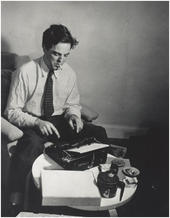Musicologist Alan Lomax was born in Austin, Texas in 1915. He began his career in the 1930s, working with his father John A. Lomax to develop the Archive of Folksong at the Library of Congress. Between 1933 and 1985, he traveled the American South, the Bahamas, Haiti, and the Eastern Caribbean many times to seek out and document African American songs, tales, and oral biography.
A believer in democracy for all local and ethnic cultures and their right to be represented equally in the media and the schools - a principle he called "cultural equity" - Lomax gave the microphone to Lead Belly, Josh White, Jelly Roll Morton, Mississippi Fred McDowell, Muddy Waters, and others, helping to create a platform for their careers. He recognized the vein of protest in traditional African American music as an essential part of the dialogue about racial and economic injustice in America. From the 1960s through the '90s, he devoted himself to comparative research on world music and dance, out of which came fresh insights about the music of the world's peoples.
In 1983 Alan Lomax founded the Association for Cultural Equity as an umbrella for both his research and the folk performance traditions he had recorded and compiled into books, albums, and films. Believing that a strong parallel exists between natural and cultural ecology, Lomax wished to provide a resource for nurturing and preserving the oral heritage of the world's diverse peoples dealing with the impact of globalization on their cultures.
Alan Lomax was awarded the National Medal of the Arts in 1986, an honorary doctorate of philosophy from Tulane in 2001, and a Grammy in 2002 for his life-long contributions to music. He joked that he had driven more miles in search of songs than anyone else on earth. He died on July 19, 2002.
From 1996-2006, The Alan Lomax Archive preserved, digitized, cataloged, and edited thousands of audio and video recordings and photos made by Alan Lomax in the U.S., the U.K., Ireland, the Caribbean, Spain, Italy, Russia, Romania, and Morocco. Many of these are published on CD in the Alan Lomax Collection on Rounder Records.
In 2004 the original recordings and papers housed at the Archive were united with the recordings made from 1933 to 1942 by Alan and his father, John A. Lomax, at the American Folklife Center of the Library of Congress ( www.loc.gov/folklife/lomax/).
Alan Lomax's recordings, films and photographs constitute primary documentation of U.S. and world culture. The Association for Cultural Equity is disseminating them to libraries in the regions in which they were recorded, and via the Alan Lomax Database, a virtual archive of documentation and scientific research by Alan Lomax from 1946 through 1993. By returning Alan's recordings to people and institutions in the Southern U.S., the Caribbean, Europe, and beyond, we hope to contribute to cultural continuity and reinvention.
"It still remains for us to learn how we can put our magnificent mass communications technology at the service of each and every branch of the human family." -Alan Lomax, 1960
